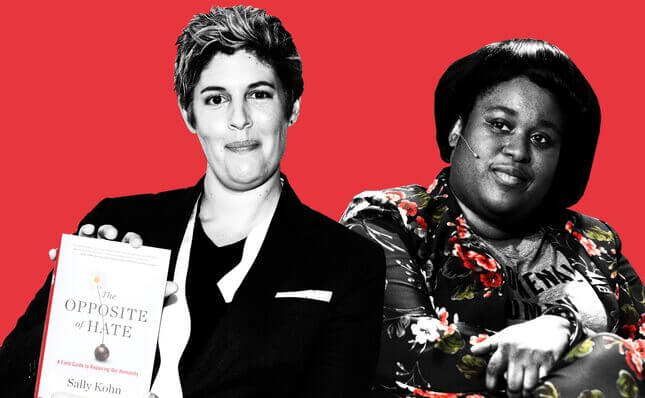The Opposite of Respect: Sally Kohn and the 'Exploitation' of Aminatou Sow
Latest

When political commentator Sally Kohn sent Aminatou Sow, host of the podcast Call Your Girlfriend, a passage from her forthcoming book The Opposite of Hate: A Field Guide to Repairing Our Humanity in which she is quoted, Sow was confused.
The quote harkened back to a night in July 2017, when Sow and Kohn split a car back to Park Slope—the Brooklyn neighborhood where they both reside, and therefore knew each other casually—and started talking about Kohn’s new book. Sow’s quote appears at the end of a chapter on learning to deal with Internet trolls by interacting with them peacefully. It read, originally, as such:
My friend writer Aminatou Sow has cautioned that there’s a compounding unfairness, even oppression, in expecting the most marginalized among us to take the high road. “Why is it black women are always asked to do the work,” Aminatou chides one day as we’re in a cab and I’m telling her about my book. “Once you’re provoked, the rules of engagement change,” she adds, “and I can fucking kill you and I’m justified in doing that”—metaphorically speaking.
The problem is, according to a series of tweets Sow published Thursday morning, she doesn’t remember saying this quote. And given the violence of the quote, the possibility that Kohn used the alleged Sow quote without double-checking it has more dangerous implications than a simple attribution mistake.
“I remember that uber ride and I have some concerns,” Sow sent to Kohn in an email on March 18, the correspondence of which was provided to Jezebel. “The nature of this quote is something you should have run by me to make sure it isn’t misrepresented or taken out of context. Knowing your audience, I am now afraid it will be.”
“First let me say I am 1000% sorry and then some and truly apologize for any hurt, anger and frustration I’ve caused. Period. Full stop. Completely,” Kohn replied via email that same day. “I also apologize for the fact that I’m clearly new at this book writing thing and quoting people thing in general and so when we talked in the cab and I asked if you were okay with me quoting you, I assumed that was the case. I honestly didn’t recheck any of the many many quotes from people in the book and I guess maybe that’s the right protocol…”
“I will say that I think your quote is one of the most profound in the book and provides an important moral anchor throughout the book…” Kohn added. To which Sow then replied that she wanted her name removed from the book, adding: “I’m also generally dismayed that you say you didn’t check many of the other quotes. That is really dicey for so many reasons.”
“You see this a lot, a lot of white women who use adjacency to black women and to black feminism specifically to get street cred.”
But the next day Kohn said that it was too late to make changes and doubled down on the fact that checking quotes is simply not standard procedure. “I do want to clarify that if it had remotely dawned on me to ask you again if I could quote you, I would have, but I didn’t do that for anyone I quoted nor has anyone ever done that when quoting me in their book nor is that, to my understanding, standard procedure in general,” she wrote. (At the time of publication Kohn did not respond to Jezebel’s request for comment.)
“Every Times story you read, every Washington Post story you read, they’re not going back and checking with people who went on record and saying are you okay with your quotes,” Kohn said on the Buzzfeed Twitter show AM2DM, adding that the book was fact-checked by “verifying the notes match up with what people said.” “I still wish thinking about the context and the explosiveness of the quote I wish I had gone back and double-checked it because I care about her.”
While there is no standard protocol in publishing when it comes to fact-checking non-fiction books, the responsibility to get facts straight often falls on the writers themselves. They can either do the work on their own or hire fact-checkers, as publishers often deem fact-checking books too expensive. And as readers have seen with books like A Million Little Pieces, a lot can go wrong in a publishing process that doesn’t fully verify a book’s content. Hypothetically, Kohn could record a private conversation without Sow knowing and then use that material later for journalistic purposes—it’s completely legal given New York’s one-party consent laws, which allows a conversation to be recorded as long as one party to the conversation agrees. (Kohn did not record this particular conversation, but she did say she took notes.)
-

-

-

-

-

-

-

-

-

-

-

-

-

-

-

-

-

-

-

-

-

-

-

-

-

-

-

-

-

-

-

-

-

-

-

-

-

-

-

-








































